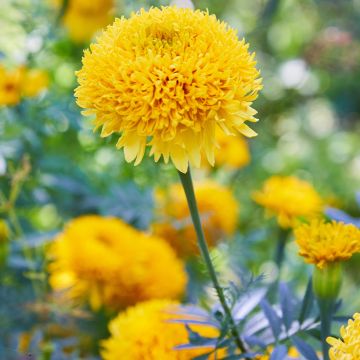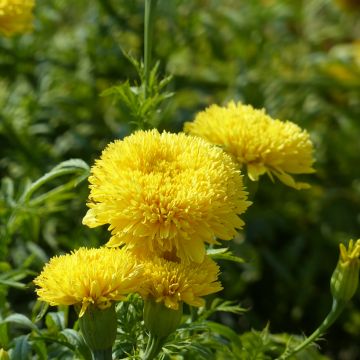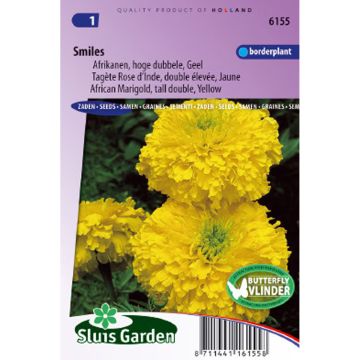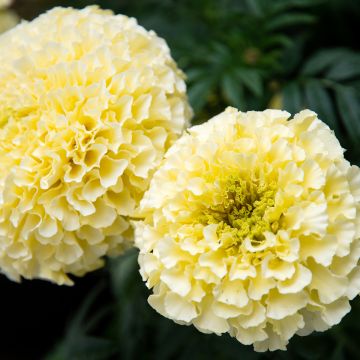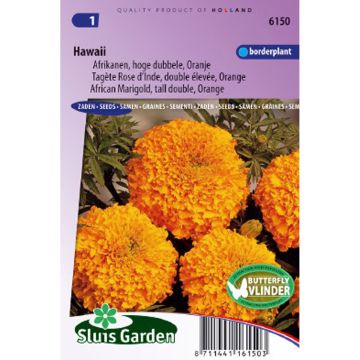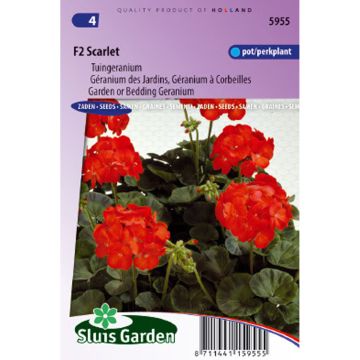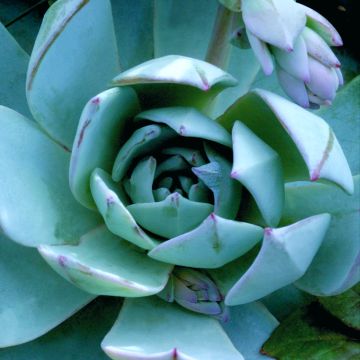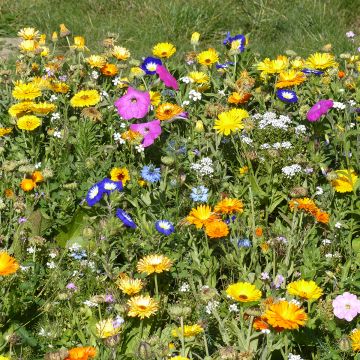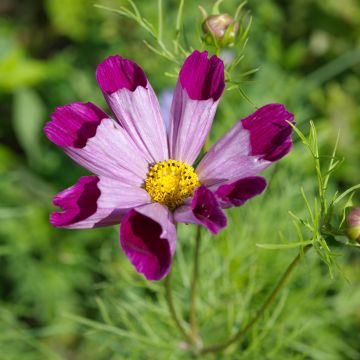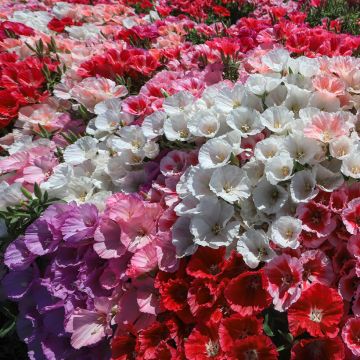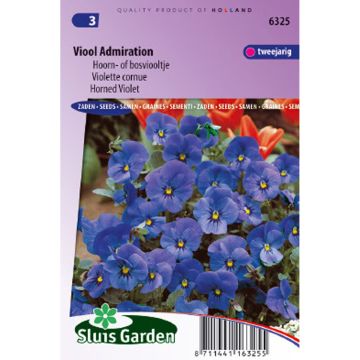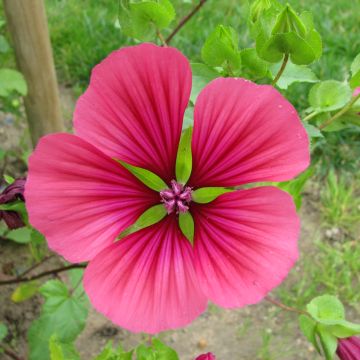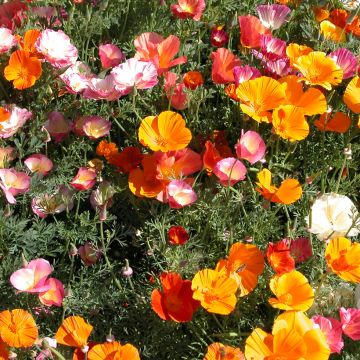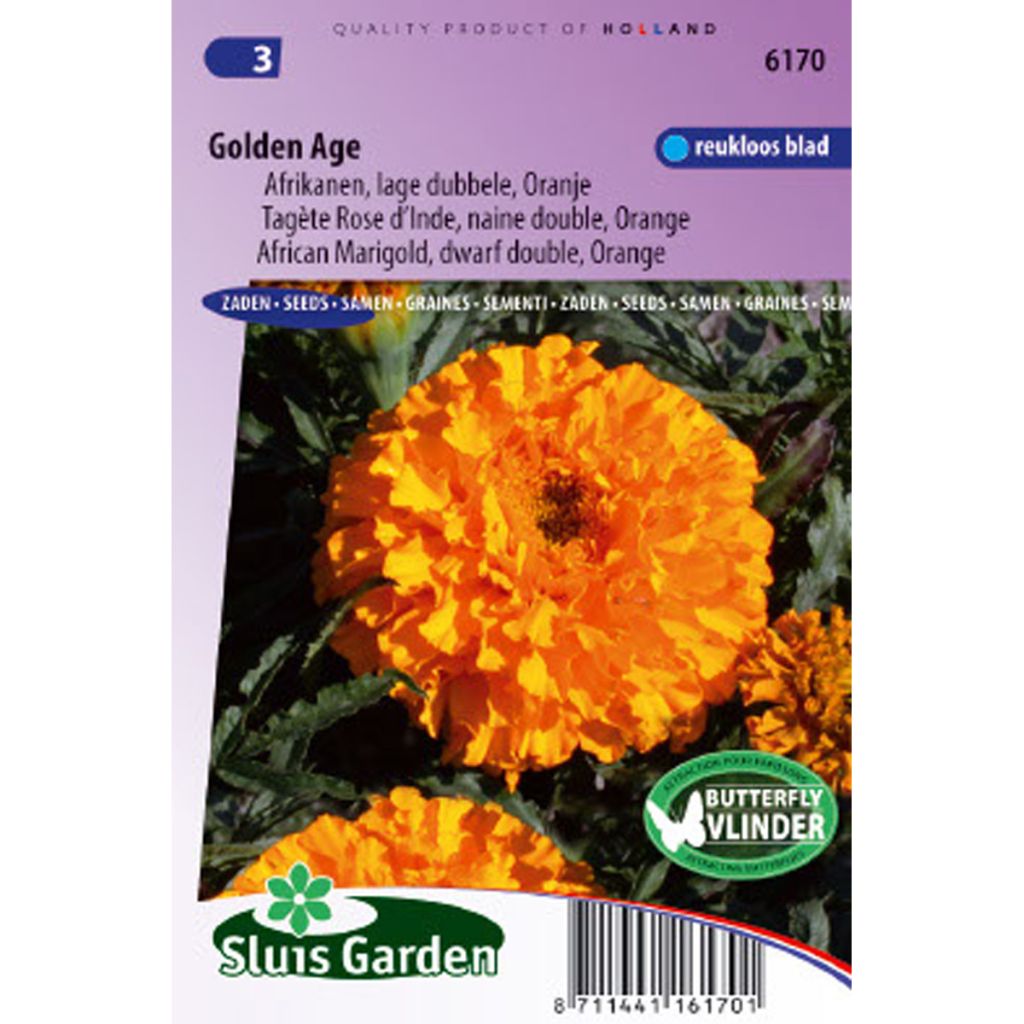

Rose d’Inde naine Golden Age - Tagetes erecta nana
Tagetes erecta nana Golden Age
Tagetes erecta nana Golden Age
Dwarf African Marigold, Indian Rose
This plant carries a 6 months recovery warranty
More information
We guarantee the quality of our plants for a full growing cycle, and will replace at our expense any plant that fails to recover under normal climatic and planting conditions.
Seed-only orders are dispatched by sealed envelope. The delivery charge for seed-only orders is €3.90.
Does this plant fit my garden?
Set up your Plantfit profile →
Description
The 'Golden Age' dwarf Marigold, whose Latin name is Tagetes erecta, is an annual herbaceous plant forming a small, highly branched bush that reaches 35 cm (14in) in height and 30 cm (12in) in width, producing numerous golden orange flowers from June until frost.
Its leaves, 5 to 10 cm (2 to 4in) long, are deeply cut and do not emit the characteristic scent of citrus and pepper found in other varieties. This is a valuable asset for those who love this flower but can't stand its smell, especially when used in bouquets.
Its sturdy angular stems bear large double flowers (8 to 9 cm (3 to 4in) in diameter), terminal, of golden orange colour resembling large fluffy pompons.
Its flowers will attract butterflies to your garden, bringing joy to the little ones.
This easy-to-grow dwarf Marigold is particularly appreciated in flower beds, borders, or pots on the terrace. The stems of the Golden Age Marigold can be used to create beautiful summer bouquets. Its color allows for lovely combinations with white or apricot flowers.
Originally from South America, it thrives in sunny or semi-shaded positions in any soil, even poor and dry. This variety is sometimes also known as "African Marigold".
Eco-friendly tip:
In the vegetable garden, Marigolds and African Marigolds are valuable assets in the fight against nematodes, those small microscopic worms that attack the roots of certain vegetables such as carrots. Surround your sensitive vegetables with these flowers to naturally repel these parasites. While protecting your vegetable garden, these flowers will also provide you with a good supply of cut flowers. After the first frost, bury the plants in the ground. They will continue to have a repellent effect against nematodes for a while and will also contribute to the renewal of organic matter in your soil.
Report an error about the product description
Flowering
Foliage
Plant habit
Botanical data
Tagetes
erecta nana
Golden Age
Asteraceae
Dwarf African Marigold, Indian Rose
South America
Other African Marigold seeds
Planting and care
Two solutions: Sow marigolds in March-April under shelter, and transplant them at a good distance (30 to 40 cm (12 to 16in)) in your flowerbeds 5 to 6 weeks after sowing. This sowing can be done in pots or in traditional seed trays for easier transplanting. Ideally, a temperature close to 18 to 20°C (64.4 to 68°F) is required for good seed germination. Germination usually takes about fifteen days. Or sow them directly in place at the end of April or early May, and then, 5 weeks later, thin out the rows to give them enough space to grow. Keep a close eye on your seedlings in the early stages, as snails are fond of these young plants. Removing faded flowers encourages repeat flowering.
Sowing period
Intended location
This item has not been reviewed yet - be the first to leave a review about it.
Flower seeds
Haven't found what you were looking for?
Hardiness is the lowest winter temperature a plant can endure without suffering serious damage or even dying. However, hardiness is affected by location (a sheltered area, such as a patio), protection (winter cover) and soil type (hardiness is improved by well-drained soil).

Photo Sharing Terms & Conditions
In order to encourage gardeners to interact and share their experiences, Promesse de fleurs offers various media enabling content to be uploaded onto its Site - in particular via the ‘Photo sharing’ module.
The User agrees to refrain from:
- Posting any content that is illegal, prejudicial, insulting, racist, inciteful to hatred, revisionist, contrary to public decency, that infringes on privacy or on the privacy rights of third parties, in particular the publicity rights of persons and goods, intellectual property rights, or the right to privacy.
- Submitting content on behalf of a third party;
- Impersonate the identity of a third party and/or publish any personal information about a third party;
In general, the User undertakes to refrain from any unethical behaviour.
All Content (in particular text, comments, files, images, photos, videos, creative works, etc.), which may be subject to property or intellectual property rights, image or other private rights, shall remain the property of the User, subject to the limited rights granted by the terms of the licence granted by Promesse de fleurs as stated below. Users are at liberty to publish or not to publish such Content on the Site, notably via the ‘Photo Sharing’ facility, and accept that this Content shall be made public and freely accessible, notably on the Internet.
Users further acknowledge, undertake to have ,and guarantee that they hold all necessary rights and permissions to publish such material on the Site, in particular with regard to the legislation in force pertaining to any privacy, property, intellectual property, image, or contractual rights, or rights of any other nature. By publishing such Content on the Site, Users acknowledge accepting full liability as publishers of the Content within the meaning of the law, and grant Promesse de fleurs, free of charge, an inclusive, worldwide licence for the said Content for the entire duration of its publication, including all reproduction, representation, up/downloading, displaying, performing, transmission, and storage rights.
Users also grant permission for their name to be linked to the Content and accept that this link may not always be made available.
By engaging in posting material, Users consent to their Content becoming automatically accessible on the Internet, in particular on other sites and/or blogs and/or web pages of the Promesse de fleurs site, including in particular social pages and the Promesse de fleurs catalogue.
Users may secure the removal of entrusted content free of charge by issuing a simple request via our contact form.
The flowering period indicated on our website applies to countries and regions located in USDA zone 8 (France, the United Kingdom, Ireland, the Netherlands, etc.)
It will vary according to where you live:
- In zones 9 to 10 (Italy, Spain, Greece, etc.), flowering will occur about 2 to 4 weeks earlier.
- In zones 6 to 7 (Germany, Poland, Slovenia, and lower mountainous regions), flowering will be delayed by 2 to 3 weeks.
- In zone 5 (Central Europe, Scandinavia), blooming will be delayed by 3 to 5 weeks.
In temperate climates, pruning of spring-flowering shrubs (forsythia, spireas, etc.) should be done just after flowering.
Pruning of summer-flowering shrubs (Indian Lilac, Perovskia, etc.) can be done in winter or spring.
In cold regions as well as with frost-sensitive plants, avoid pruning too early when severe frosts may still occur.
The planting period indicated on our website applies to countries and regions located in USDA zone 8 (France, United Kingdom, Ireland, Netherlands).
It will vary according to where you live:
- In Mediterranean zones (Marseille, Madrid, Milan, etc.), autumn and winter are the best planting periods.
- In continental zones (Strasbourg, Munich, Vienna, etc.), delay planting by 2 to 3 weeks in spring and bring it forward by 2 to 4 weeks in autumn.
- In mountainous regions (the Alps, Pyrenees, Carpathians, etc.), it is best to plant in late spring (May-June) or late summer (August-September).
The harvesting period indicated on our website applies to countries and regions in USDA zone 8 (France, England, Ireland, the Netherlands).
In colder areas (Scandinavia, Poland, Austria...) fruit and vegetable harvests are likely to be delayed by 3-4 weeks.
In warmer areas (Italy, Spain, Greece, etc.), harvesting will probably take place earlier, depending on weather conditions.
The sowing periods indicated on our website apply to countries and regions within USDA Zone 8 (France, UK, Ireland, Netherlands).
In colder areas (Scandinavia, Poland, Austria...), delay any outdoor sowing by 3-4 weeks, or sow under glass.
In warmer climes (Italy, Spain, Greece, etc.), bring outdoor sowing forward by a few weeks.

































